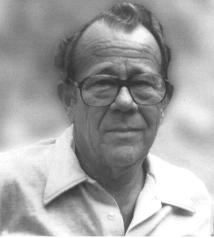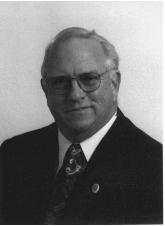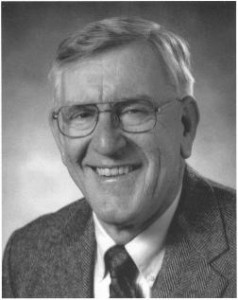2000 Honorary Life Member Selections
 DR. FRANK L. HAYNES, JR.
DR. FRANK L. HAYNES, JR.
Frank Haynes was born and raised in Hodges, Alabama. He passed away on June 5th, 2000 at the age of 79. Frank was known by those who worked with him as a generous individual and a true gentleman. He received his B.S. from Auburn University in 1946 and a Ph.D. from Comell in 1951. Frank was hired in 1951 as the potato breeder at North Carolina State University. In 1960, he became part of the North Carolina State University-US-AID mission for agriculture in Peru, and, as the program progressed from institutional development to priority commodity approaches, he became part of the National Potato Improvement Team. The International Potato Center (CIP) at Lima, Peru emerged in 1971 from this National Potato Improvement Program.
He had a close association with the International Potato Center until his retirement in 1987, spending a few weeks to a few months in Peru every year. For many years, he served as in informal liaison between the PAA and the newly created International Potato Center. He initiated the diploid potato breeding program at North Carolina State University in 1966 which became a contract with CIP in 1972 and continued until his retirement in 1987.
One of his unique contributions that had far-reaching impact was his recurrent selection program using South American cultivated diploid germplasm for adaptation to a long-day growing environment. This involved the establishment of an initial population stemming directly from introduced materials with very poor adaptation. Poor adaptation, in this sense, meant a population of potato genotypes that barely tuberized at all. Handling such material requires considerable imagination in what future results might look like after years of selection. On this score, Frank deserves high marks. He worked on the adaptation and utilization of a cultivated species population derived from S. phureja and S. stenotomum. He had the vision to realize the importance of breaking the existing gene flow barrier between low latitude potato germplasm to high latitude populations. Such a “bridge” was not achieved in a single act, but rather required years of effort. Today the descendants of these populations are a source of resistance to numerous pathogens and to high temperature, and sources of high specific gravity and high xanthophyll content in potatoes. Over the years, he and his graduate students screened, identified, and enhanced this population for a number of traits, including tuberization response under long day growing conditions, heat tolerance, high specific gravity, resistance to early blight, and resistance to soft rot Erwinias. He served as the major advisor for a number of U.S. and international M.S. and Ph.D. students. He also worked closely with the USDA/ARS potato breeding program in Beltsville, Maryland, evaluating promising new selections for performance under North Carolina growing conditions.
Frank’s cultivar development efforts led to the release of Boone and Plymouth in 1955 and Coastal Chip in 1990, varieties that served the Piedmont and Mid-Atlantic growing areas: He was an active member of the Northeastern Regional Project, NE-107 (now NE-184). He served froun 1963 to 1987 as the Southern Region Technical Committee representative on the Inter-Regional Potato Introduction Project, IR-1 (now NRSP-6), and several times as Chair, Vice Chair and Secretary.
Frank was a member of The Potato Association of America from 1951 to 1987. He was also a member of the Breeding and Genetics Section. He presented the results of his research at many meetings over the years.
For his contributions in exploring the potential role of diploid species of Solanum in the development of improved potato varieties, for identifying valuable new geunplasm for use by U.S. potato breeding programs, and for his role in the development of the International Potato Center (CIP) in Lima, Peru, and beginning in 1971 as a member of the US-AID mission to Peru, The Potato Association of America posthumously recognizes Frank Haynes as an Honorary Life Member.
Creighton Miller & Richard Sawyer, Nominators
 DUANE PRESTON
DUANE PRESTON
Duane Preston was raised on a small farm near Hillsboro, ND, and his roots in the Red River Valley of North Dakota and Minnesota are deep. He received a B.S. in Animal Science and Agronomy from North Dakota State University in 1963 and returned to complete an M.S. in Natural Resource Management in 1972. He was an Extension Agen in Clay County, MN from 1964-1967 and County Extension Director, Kittson Co., MN 1967-1977, before assuming his present position as Area Extension Agent, Potatoes, University of Minnesota Extension Service in 1977. He currently holds the rank of Professor.
Duane is an extraordinarily effective potato extension educator who has worked for the University of Minnesota and/or North Dakota State University for some thirty-six years. He has been an ambassador for the potato industry and the Red River Valley. In effect, Duane has been the team leader for the potato research and extension efforts in North Dakota and Minnesota. He helped guide the shifting from dry land to irrigated acreage, which has been instrumental in the success of today’s potato production. He also developed a comprehensive program that has dramatically changed and improved the quality of the potato crop in storage. His efforts and expertise will continue to have an enormous, positive impact on growers and the industry, both nationally and internationally.
Duane is exceptional in his ability to take highly technical information and make it understandable to a non-technical audience, e.g., growers and the general public. While he organizes and participates in many of the traditional extension meetings invoh4ng dozens of growers, Duane is at his best with his foot resting on the drawbar of a tractor, answering questions on an individual basis. While this educational method may not be the most efficient use of his time, this one-on-one approach is undeniably effective. He is equally successful in communicating the issues facing the potato industry to such diverse audiences as policy makers and research scientists.
His teaching and writing has created international awareness of the role of reducing sugars in finished potato chip quality. He has also demonstrated the critical importance of crop sprayer calibration in potato disease control. He is the recipient of seven agriculture and potato industry awards. His outstanding educational work has gained national recognition by the National Potato Council. One of his most successful outreach activities is the annual Potato Expo (in 1999 this event evolved into the Potato and Small Grain Expo). This two-day meeting, an annual event since 1986, attracts more than 600 participants to its educational seminars and more than 2,000 to the associated industry exhibits. Over the years, Duane has written more than 250 articles for national potato magazines. His column, Preston’s Pointers, has been featured monthly for 23 years in the Valley Potato Grower, circulation 12,300 nationwide. His columns have covered almost every aspect of potato production and utilization, from seed selection to overseas marketing
Throughout his career Duane has been prominently involved in national activities related to the seed potato production and the potato chip industries. He is a regular presenter at the National Potato Council (NPC) Seed Potato Seminar, NPC Chipping Potato Seminar and the National Snack Food Association. He served as Chair of the National Anti-Bruise Commtittee. He has done international consulting in Japan, Canada, Australia, Central and South America, and Europe.
Duane has been a member of The Potato Association of America since 1978. He has served as Chair of the Extension Section and served as a Director on the Executive Committee from 1988 through 1992. Other offices held in The Potato Association of America have included Vice President in 1993-1994, President Elect in 1994-1995, and President in 1995-1996. As President, he brought about or initiated changes in the organization that the membership and previous officers had considered, debated, but did not implement. These include development and/or updating bylaws for each of the eight sections and development of job descriptions for all PAA employees. He also presided over the relocation of and permanent staffing for Headquarters and appointed a committee to implement reformatting of the Journal. Many of the organizational changes that are just now being realized resulted from his leadership. In addition, he was Co-Chair of the Local Arrangements Committee in 1998, and presently serves as Chair of the Sustaining Membership Committee.
Duane Preston personifies the very heart and soul of the potato industry in Minnesota and North Dakota. He is the one person known by absolutely everyone associated with the potato industry. His exceptional service and commitment to the industry and to the average farmer has been remarkable. He has always stood ready to help with any problem that has been brought to his attention. For his total dedication to agriculture, his years of service to the extension service, his leadership in the PAA and the potato industry as a whole, Duane Preston is recognized as an Honorary Life Member.
Creighton Miller & Gary Secor, Nominators
 JOSEPH B. SIECZKA
JOSEPH B. SIECZKA
Joe Sieczka was raised in Blaisdell, NY. He received an A.A.S. in Agronomy and Soil Conservation from SUNY at Alfred, NY in 1960. In 1963, he earned a B.S. in Agronomy from the University of Georgia, and he received an M.S. in Vcgetable Crops from Cornell University in 1973.
Joe’s entire professional career has been in potato extension and research, starting in 1964 as a cooperative extension agent for Steuben County In western New York. In 1968, he was appointed Extension Specialist in the Department of Vegetable Crops at Cornell, where he was responsible for the statewide extension potato program. He was promoted to Senior Extension Associate in 1975 and to Associate Professor in 1981. In 1980, there was a major shift in responsibilities when he became Coordinator of the Long Island Horticultural Research Lab, a position that he still occupies.
Although his duties on Long Island have required that he spend part of his time in adininistration and with vegetables other than potatoes, Joe has always maintained an active potato program. His research has made significant contributions to the development of new potato varieties, adjustment of fertilizer programs, weed control, and other areas of applied research. His potato nutrition work has resulted in reduced grower costs and minimized the impact of nitrate on ground water. His potato extension programs are widely acclaimed, and he has the respect of the industry, whether grower, chipper/processor, or supplier. Joe has been a role model and mentor for many young potato specialists and scientists in the Northeast and to the many county agents in New York who have worked with the potato industry. He has maintained a high degree of subject matter competencies and has shown a commitment to excellence. Thus, he has been a total extension potato specialist, a model in the Northeast.
Joe has been very active in the NE-184 (formerly NE-107) regional project–“Development of New Potato Clones and Varieties in the Northeast Area,” and he has served in all official capacities in this group. Joe’s involvement in this project led to his important role in the successful development of golden nematode resistant varieties. Availability of resistant varieties has been and continues to be critical to the viability of the New York potato industry, since growers in several production areas of the state are required to grow golden nematode resistant varieties.
Joe has been extremely active in the PAA, which he joined in 1968. He has been a member of the Extension Section where he served respectively as Secretary/Treasurer, Vice Chair, and Chair in 1981, 1982, and 1983. He has also participated in the Production and Management Section as well as the Physiology and Utilization Sections. When the annual meeting was held in Ithaca (1986), Joe co-chaired the Local Arrangements Committee. From 1986-1988, he was a Director, and he became President in 1993. Joe has made major contributions to the PAA through his tireless work on two of the most important PAA publications, including co-editing the first and second PAA Handbooks “Commercial Potato Production in North America” (1981 and 1993) and co-authoring the four PAA North American Potato Variety Handbooks. He has also served on the Graduate Student Award Committee.
In summary, Joe has contributed greatly to the Association, as a leader and as a cooperator/participant. He has contributed to potato science and to the educational materials for those associated with potatoes. He has been a Ieader for the potato industry in New York, and he has served admirably in his administrative position during some environmentally and politically sensitive issues on Long Island. He has strong opinions, but always presents them in a way that commands respect from everyone, whether or not they agree with his position.
For his commitment to the potato industry, both in his home state and throughout the world, and his unwavering and significant support of the PAA as demonstrated by his willingness to serve in numerous leadership capacities, the PAA recognizes Joseph B. Sieczka with honorary life membership.
Creighton Miller & Elmer Ewing, Nominators
RONALD E. VOSS
Ron Voss is a native of Nebraska. He received his BS in Agriculturc in 1964 and an MS in Agronomy (Soils) in 1966, both from the University of Nebraska In 1969, he received Ph.D. in Agonomy (Soil Fertility) from Iowa State University. Since 1969, he has been an Extension Vegetable Specialist at the University of California, Davis working on potato, sweet potato, alliums, general vegetables, sustainable agriculture, and small farms. From 1995-1998 Ronwas founding Director of the University of California Vegetable Research and Information Center, and from 1985-1995, he was Director of the University of California Small Farm Program. He currently devotes 50% of his time to research.
His primary project is Potato Cultivar Development, a highly integrated program involving research scientists from several states representing multiple disciplines. Ron has been involved in the selection and evaluation of material from national programs. He has played a key role in supporting the California potato industry through his leadership in developing several new potato cnitivars including Sierra, Tejon, CalWhite, and CalRed for the diverse growing conditions found in California where platting and/or harvesting of potatoes occurs virtually every day of the year. He has cooperated in the evaluation and release of a number of other cultivars. Most of the potato cultivars currently grown in California have been introduced through this program. In addition, the research involves various cultural practices that need to be defined for these new cultivars. Support for his effort has been generated from diverse sources including the California potato industry, USDA, Snack Food Association, and private European potato breeding companies.
Ron is recognized nationally and internationally for contributions to several commodity industries. Ron is a true team player providing leadership in working together toward a common goal and in establishing strong cooperative linkages with potato researchers throughout the Central and Western United States, the latter as a major contributor (and first chair) to the Western Regional Coordinating Committee (WCC-27). Most recently, Ron has cooperated with Texas and Colorado research personnel in securing funding for a project rifled “Potato Breeding and Cultivar Development in the Southwest”.
Ron has worked especially hard to place himself at the vanguard of potato knowledge with travel and sabbatical leaves, including a year at Cornell University worldng in Plant Pathology and Breeding in 1976 and at CIP in Lima, Peru in 1987. In 1999, he completed a sabbatical leave in Mexico, The Netherlands, Spain, France, Ecuador and Peru. In addition, he has been a visiting scientist working on onion, garlic, and potato research in, Chile, Australia, Venezuela, Korea, Russia, and Egypt. Ron has formed an extensive network of international cooperators that has facilitated his own research and has proved of great benefit to other programs as well. He is recognized as a professional’s professional in his research, extension, and administrative endeavors.
For more than 30 years, Ron has been a constant contributor and has provided outstanding leadership to the Potato Association of America through involvement in section business, committee and executive board membership, and many other roles. He has held numerous offices in the PAA. They include: Chair-Extension Committee, 1972-1973; Chair-Auditing Committee, 1975-1976; Chair-Graduate Student Awards Committee, 1976 (first year of awards) and 1980; Chair Local Arrangements and Program Committee, 1981-1982; Vice President, 1987-1988; President Elect, 1988-1989; and President, 1989-1990.
In recognition for outstanding contributions as an extension educator, administrator, and PAA member and leader, the PAA recognizes Ronald E. Voss as an Honorary Life Member.
Creighton Miller & Bob Thornton, Nominators